一、1.求阶乘 - 蓝桥云课

算法代码:
cpp
#include <bits/stdc++.h>
using namespace std;
#define ll long long
ll check(ll n)
{
ll cnt=0;
while(n)
{
cnt+=(n/=5);
}
return cnt;
}
int main()
{
ll k;
cin>>k;
ll L=0,R=1e19;
while(L<R)
{
ll mid=(L+R)>>1;
if(check(mid)>=k)
{
R=mid;
}
else
{
L=mid+1;
}
}
if(check(R)==k)
{
cout<<R;
}
else
{
cout<<-1;
}
return 0;
}二、1.青蛙过河 - 蓝桥云课
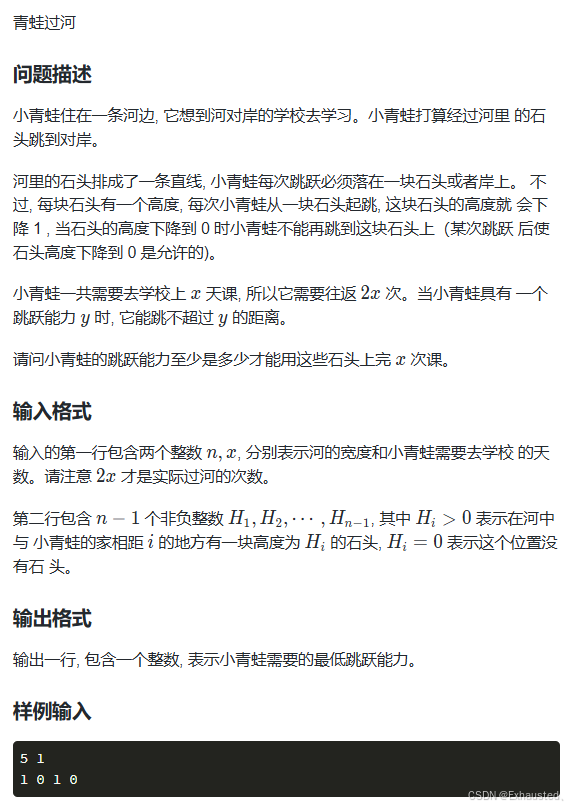
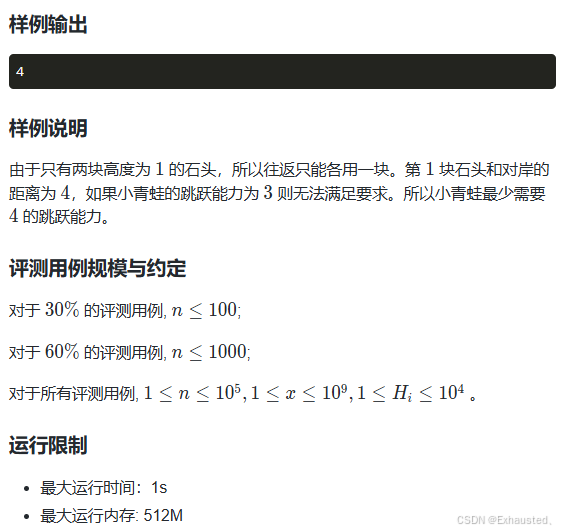
算法代码:
cpp
#include <bits/stdc++.h>
using namespace std;
int n,x;
int h[100005];
int sum[100005];
bool check(int mid)
{
for(int i=1;i<n-mid+1;i++)
{
if(sum[i+mid-1]-sum[i-1]<2*x)
{
return false;
}
}
return true;
}
int main()
{
cin>>n>>x;
sum[0]=0;
for(int i=1;i<n;i++)
{
cin>>h[i];
sum[i]=sum[i-1]+h[i];
}
int L=1,R=n;
while(L<R)
{
int mid=(L+R)/2;
if(check(mid))
{
R=mid;
}
else
{
L=mid+1;
}
}
cout<<L;
return 0;
}三、1.管道 - 蓝桥云课
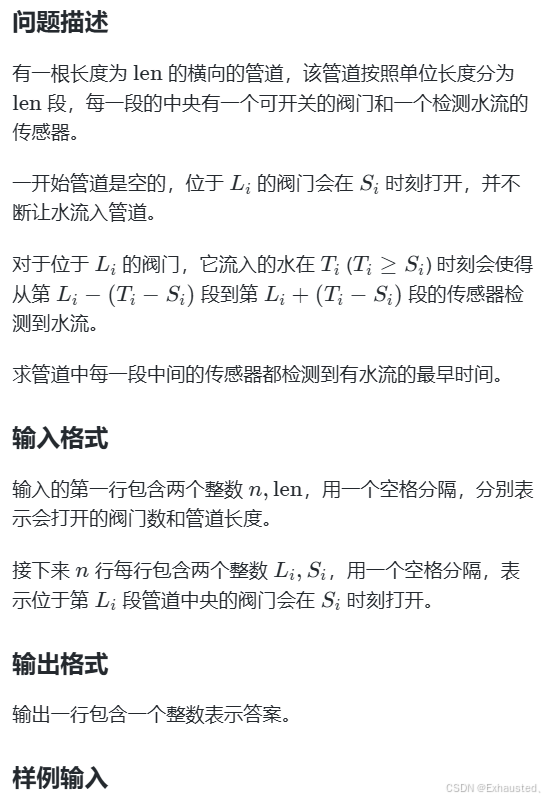
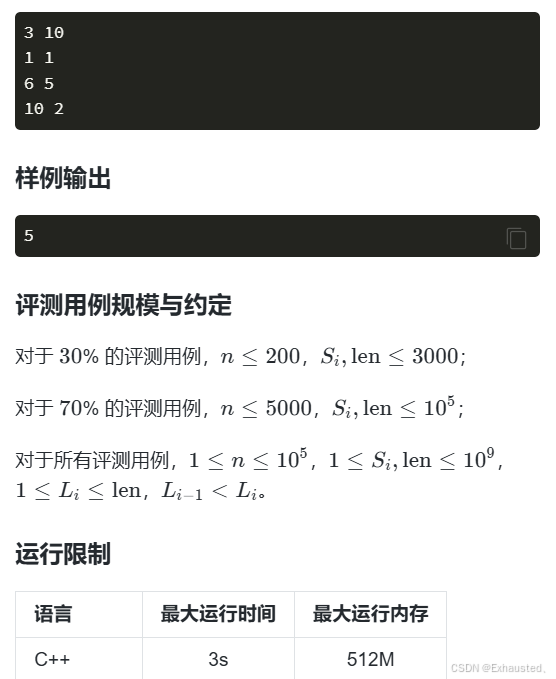
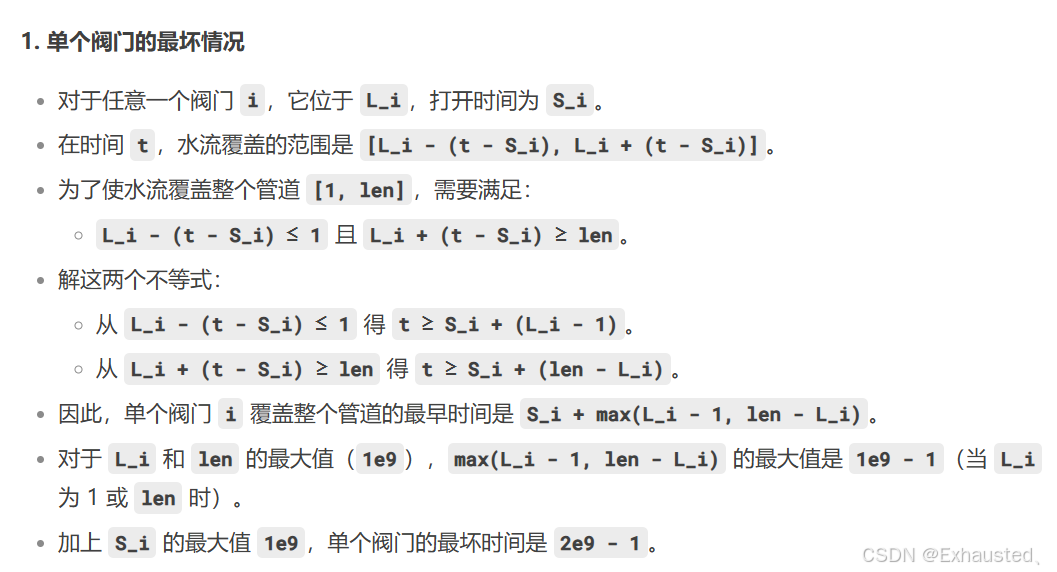
算法代码:
cpp
#include<bits/stdc++.h>
using namespace std;
const int N=1e5+10;
const int LEN=1e9;
int n,len;
int L[N],S[N];
bool check(int t)
{
int cnt=0;
int last_L=2,last_R=1;
for(int i=0;i<n;i++)
{
if(t>=S[i])
{
cnt++;
int left=L[i]-(t-S[i]);
int right=L[i]+(t-S[i]);
if(left<last_L)
{
last_L=left,last_R=max(last_R,right);
}
else if(left<=last_R+1)
{
last_R=max(last_R,right);
}
}
}
if(cnt==0)
{
return false;
}
if(last_L<=1&&last_R>=len)
{
return true;
}
else
{
return false;
}
}
int main()
{
scanf("%d%d",&n,&len);
for(int i=0;i<n;i++)
{
scanf("%d%d",&L[i],&S[i]);
}
int LL=0,R=2e9,ans=-1;
while(LL<=R)
{
int mid=((R-LL)>>1)+LL;
if(check(mid))
{
ans=mid,R=mid-1;
}
else
{
LL=mid+1;
}
}
printf("%d\n",ans);
return 0;
}四、1.技能升级 - 蓝桥云课

算法代码:
cpp
#include <bits/stdc++.h>
using namespace std;
typedef long long ll; // Note: long long is needed
const int N = 100100;
int a[N], b[N]; // Store a_i, b_i
int n, m;
bool check(ll mid) { // Check if the last skill upgrade can reach mid
ll cnt = 0;
for (int i = 0; i < n; ++i) {
if (a[i] < mid)
continue; // Initial value of skill i is less than mid, skip
cnt += (a[i] - mid) / b[i] + 1; // Number of times skill i is used
if (cnt >= m) // Total upgrades ≥ m, mid is too small
return true;
}
return false; // Total upgrades < m, mid is too large
}
int main() {
cin >> n >> m;
for (int i = 0; i < n; ++i)
cin >> a[i] >> b[i];
ll L = 1, R = 1000000; // Binary search for the highest possible last attack
while (L <= R) {
ll mid = (L + R) / 2;
if (check(mid)) L = mid + 1; // Increase mid
else R = mid - 1; // Decrease mid
}
ll attack = 0;
ll cnt = m;
for (int i = 0; i < n; ++i) {
if (a[i] < R) continue;
ll t = (a[i] - L) / b[i] + 1; // Number of upgrades for skill i
if (a[i] - b[i] * (t - 1) == R)
t -= 1; // If skill's upgrade equals R exactly, other skills are better
attack += (a[i] * 2 - (t - 1) * b[i]) * t / 2;
cnt -= t;
}
cout << attack + cnt * R << endl;
return 0;
}